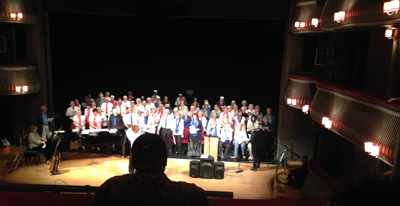
By Alison Beck, the Choir with No Name’s fundraising and communications officer
For years, a growing number of scientists have been fascinated by what happens to humans when we sing in groups. What’s so magical about the simple act of singing together with other people? Why - and how - does it transform some people’s lives?
Yesterday, I attended the Royal College of Music’s ‘Singing and Wellbeing’ symposium, which gathered together leading scientists and practitioners from all over the world to examine the latest exciting research in this field. Scientists travelled from as far afield as Australia, Norway, and Sweden to present their latest research.
I was there with the wonderful ladies and gents of the Choir with No Name South London – a choir of about 30 people who have experienced homelessness, or who are otherwise on the edges of society. They get together to sing (and eat!) every Tuesday night in Elephant & Castle, London.
Here are 6 things that particularly thrilled me about the symposium:
1. RICKARD ASTROM’S LIVE EXPERIMENT DEMONSTRATED THAT PEOPLE’S HEARTBEATS SYNCHRONISE WHEN THEY SING TOGETHER. AMAZING!
Rickard placed heart monitors on the fingers of four Choir with No Name choir members, and two random volunteers from the delegates in the room. Above us on a big screen, we could see their individual heartbeats displayed live, in real time. Then the choir and everyone in the room sang a simple song together, over and over again. Slowly but surely, you could see that the six hearts were pulsing at the same time.
I managed to capture some video footage of this – have a look and see if you can spot the peaks in the heart monitors synchronising:
Rickard Astrom is a researcher with Gothenburg-based research team BodyScore, which studies the effects of music on health. In 2013 they published pioneering research in Frontiers in Psychology showing that hearts beat in sync when people sing together.
2. THE CHOIR WITH NO NAME’S PERFORMANCE, AND THEIR STANDING OVATION
Our South London choir had been invited along in order to be a living, breathing demonstration of the impact that singing together can have on people’s lives.
Directed by their choir leader Sam Chaplin, they performed three numbers: ‘Sit Down’ by James, ‘Way Over Yonder’ by Carole King, and ‘You Are the Sunshine of my Life by Stevie Wonder’. I can honestly say they smashed it out of the park – especially Sit Down (there were a few tears among the audience at that point!). At the end, they received wild applause and a standing ovation… Richly deserved!
3. ERIC WHITACRE’S INSPIRATIONAL REMARKS
Legendary choral composer Eric Whitacre helped open the symposium, and told a powerful story about his first ever experience of singing in a choir, at university. “It was as if my entire life I’d been seeing in black and white, and was now seeing in glorious technicolour. I was trembling all over, I even started giggling, and there were tears.” They were singing Mozart’s Requiem.
“For the first time in my life, I was part of something bigger than myself. Singing in a choir is a communal experience that I find nowhere else in life. And to find that science can prove what we already knew about this…!”
4. PROFESSOR ROBIN DUNBAR’S TALK ON EVOLUTION, ENDORPHINS AND SINGING
Renowned Oxford professor Robin Dunbar gave us a whistle-stop tour of evolution, social groups and the importance of music-making and singing. I can’t possibly do it justice here in just a few words, but what stood out for me was the fact that the size and cohesion of your social network has as big an effect on your risk of dying as giving up smoking…
The act of making music together releases endorphins; way more endorphins than if you’re just listening to music. It’s a modern human version of what primates do when they groom each other.
5. THE ‘SINGING FOR BREATHING’ CHOIRS SHOWED HOW SINGING TOGETHER HAS HELPED WITH THEIR RESPIRATORY DISEASES
In the afternoon, we were treated to a performance by the massed ranks of four ‘Singing for Breathing’ choirs – hospital-based singing groups for people with respiratory problems:

6. THE POWERFUL IMPACT OF SINGING IN A CHOIR UPON CANCER SUFFERERS AND SURVIVORS
Carly Reagon and colleagues from Cardiff University presented their latest research. They’ve been working with cancer charity Tenovus, examining the extraordinary impact of their choirs on the people who join them (who are a mixture of cancer patients, survivors, friends and relatives).
What really blew me away here was that their findings mirrored what we have discovered happens with our Choir with No Name members. For example:
- Singing in the choir is fun – and fun is actually an incredibly important thing to have in your life
- The word “uplifting” came up constantly in qualitative data
- Choir members appreciated connecting with others “in the same boat” as them
- But at the same time, being in the choir is about singing, rather than being defined by the illness (which is a relief to many participants)
Here at the Choir with No Name we’ve just carried out our annual survey of all choir members, across our four choirs. We’re still crunching the numbers, but I’m expecting that our results will be along very similar lines… and we’ll definitely be sharing the findings.
If you’d like to hear more about what the Choir with No Name is up to, follow us on Twitter or Facebook – or why not come to a gig and experience what we do first-hand?! We have lots of public performances coming up.
Yesterday’s symposium, ‘Recent advances in the science of singing, wellbeing and health’, was convened by the Sidney De Haan Research Centre for Arts and Health and Canterbury Christ Church University. It took place yesterday at the Centre for Performance Science at Royal College of Music in London.
